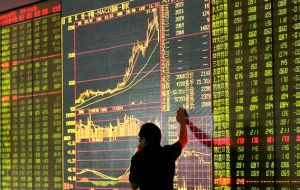MercoPress. South Atlantic News Agency
Chinese stocks tumble as Beijing announces an end to the era of cheap credit
 Shanghai Composite index had fallen more than 20% since the high reached in February
Shanghai Composite index had fallen more than 20% since the high reached in February Chinese stocks touched a four-and-a-half-year low on Tuesday amid persistent concerns over the government's credit-tightening policy. The Shanghai Composite SSE index fell as much as 5.8% at one point, before a late rally meant it ended down 0.3%.
The rebound came after China's central bank said that it would guide market rates down to “reasonable” levels. Last week, the bank indicated that the era of cheap credit was over helping to trigger falls on global markets.
The sharp falls seen earlier on Tuesday marked the first time since January 2009 that the Shanghai Composite index had fallen below the 1,900 point mark.
The steep decline meant that the index had fallen by more than 20% since the high reached in February, meaning it had entered a “bear market” - defined as a fall of at least 20% over a period of at least two months.
However, shares rebounded later in the day after the People's Bank of China (PBOC), the country's central bank, attempted to ease fears by saying that it would guide market rates to reasonable levels.
The Shanghai Composite SSE index ended the day down just 3.73 points at 1,959.51, and European markets opened higher following the bank's comments.
PBOC also blamed the recent spike in inter-bank rates - the interest rates banks charge each other on a daily basis - on seasonal factors, and said they would drop back down. But the leadership has been keen to press the point that its credit-tightening policy will continue.
The People's Daily, often regarded as the mouthpiece of the ruling party, wrote in a commentary on Tuesday that the central bank or the securities regulatory commission was “not the stock market's 'wet nurse'.”
“So-called market-saving and market-boosting acts will not help the stock market, rather they will harm the market,” it said, adding they would hamper efforts to improve the country's fledgling capital markets.
A government-led credit boom has been one of the key contributors to China's economic growth in recent years. Chinese companies have generally relied on lenders for credit as the country's debt capital markets, where companies borrow money from investors, are not as well-developed as they are in the West.
After the global financial crisis in 2008-09, China unleashed a huge monetary stimulus in an attempt to boost economic growth. While the credit boom helped cushion the impact of the crisis on its economy, it led to concern that too much cheap cash had flooded its financial system.
There have been calls for China to contain this credit boom and also to reduce its reliance on credit and investment-led growth.
In recent days the PBOC temporarily turned off the flow of cheap money in an attempt to impose more discipline on its banks and reduce their reliance on credit.
That resulted in China's banks - mostly state-owned - charging each other some of the highest lending rates ever - over 25% in some cases - triggering fears of a credit crunch.
There were fears that the money markets could freeze up completely and put smaller lenders out of business as a result of the central bank's drastic move.
But inter-bank lending rates eased on Monday as PBOC made it clear big commercial banks should do a better job of managing their cash reserves and keep lending to smaller players.
However, the central bank did not signal it was turning the taps back on, leading traders to speculate that borrowing costs would remain relatively high for medium-sized banks and potentially dent profits.
BBC chief business correspondent Linda Yueh said the PBOC's move means that “banks can't count on the central bank for cheap cash”.
“In fact, the central bank wants to root out the poorly-performing banks - especially those in the so-called shadow banking system.”
China, the world's second-largest economy, has been one of the biggest drivers of global growth in recent years. Its economic rise has seen it become a key trading partner of the other Asian economies, becoming a major market for exports from those countries.
It buys a variety of products, ranging from commodities such as iron ore and coal from Australia and Indonesia to consumer goods from Japan and South Korea.
Analysts and investors have been concerned that if growth in China slows sharply, it will affect growth in the region's economies that rely on Chinese demand. As a result, regional markets have been nervous about the developments in China.




Top Comments
Disclaimer & comment rules-

-

-

Read all commentsOpps......south america's savior seems to be mis-firing on a few cylinders. With international businesses pulling out of China for bureacratic BS, logistical nitghmares, transit costs and legalese knots.......China's glory days are behind them. Now they need to find a way to maintain the newly created middleclass. Such a dilema for China.
Jun 25th, 2013 - 08:27 pm 0Er ummm, shall I be the first to say it,,,,
Jun 25th, 2013 - 09:15 pm 0dum dum dum
TOLD YA
They are in a much worse crisis than the USA was a few years back. This could bring on civil riots into the cities not just in the countryside.
Does anyone else smell revolution?
I am thinking the trolls will not be on this article......in fact they are light everywhere. Their checks must be bouncing.
Jun 26th, 2013 - 09:49 am 0Commenting for this story is now closed.
If you have a Facebook account, become a fan and comment on our Facebook Page!